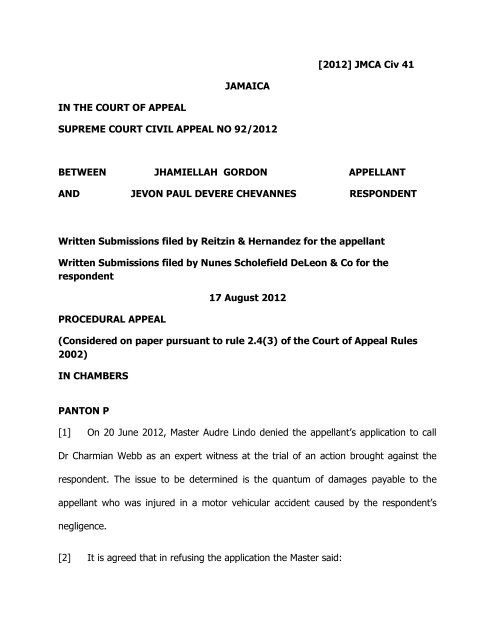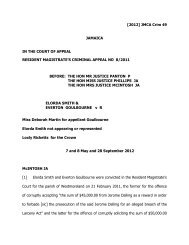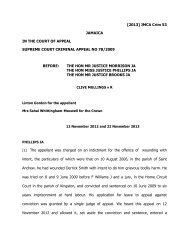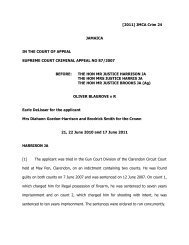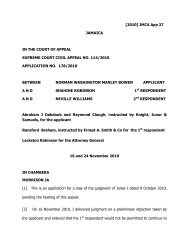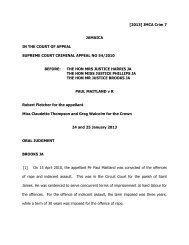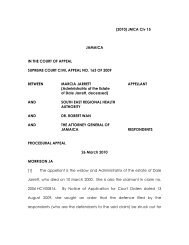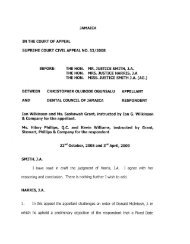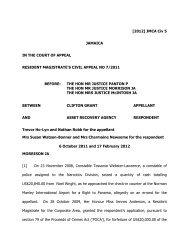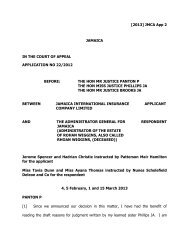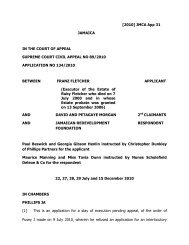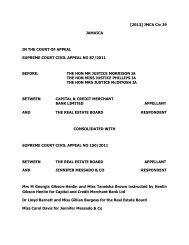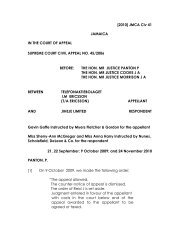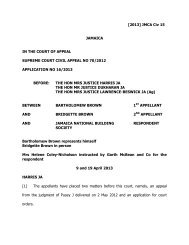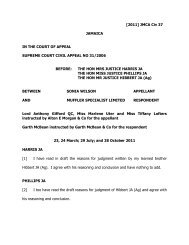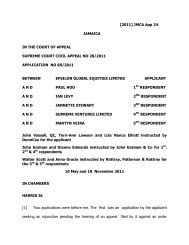Gordon (Jhamiellah) v Chevannes (Jevon Paul Devere).pdf
Gordon (Jhamiellah) v Chevannes (Jevon Paul Devere).pdf
Gordon (Jhamiellah) v Chevannes (Jevon Paul Devere).pdf
You also want an ePaper? Increase the reach of your titles
YUMPU automatically turns print PDFs into web optimized ePapers that Google loves.
[2012] JMCA Civ 41<br />
JAMAICA<br />
IN THE COURT OF APPEAL<br />
SUPREME COURT CIVIL APPEAL NO 92/2012<br />
BETWEEN JHAMIELLAH GORDON APPELLANT<br />
AND JEVON PAUL DEVERE CHEVANNES RESPONDENT<br />
Written Submissions filed by Reitzin & Hernandez for the appellant<br />
Written Submissions filed by Nunes Scholefield DeLeon & Co for the<br />
respondent<br />
PROCEDURAL APPEAL<br />
17 August 2012<br />
(Considered on paper pursuant to rule 2.4(3) of the Court of Appeal Rules<br />
2002)<br />
IN CHAMBERS<br />
PANTON P<br />
[1] On 20 June 2012, Master Audre Lindo denied the appellant’s application to call<br />
Dr Charmian Webb as an expert witness at the trial of an action brought against the<br />
respondent. The issue to be determined is the quantum of damages payable to the<br />
appellant who was injured in a motor vehicular accident caused by the respondent’s<br />
negligence.<br />
[2] It is agreed that in refusing the application the Master said:
“As it relates to Dr. Webb, based on the qualifications<br />
set out, she appears to be sufficiently qualified to be<br />
called an expert, however the reports which have been<br />
served do not indicate that Dr. Webb can provide<br />
independent assistance, which is independent and<br />
unbiased. As such, I do not think that Dr. Webb can be<br />
permitted to be an expert and for her reports to be put<br />
in as expert reports.”<br />
The Master has to be interpreted as saying that Dr Webb would be biased and would<br />
lack independence if she was called as a witness. However, there is no explanation<br />
provided by the Master for arriving at that conclusion, while at the same time stating<br />
that the doctor was qualified to be an expert.<br />
Grounds of appeal<br />
[3] Five grounds of appeal were filed by the appellant. They are as follows:<br />
“i) The learned Master failed to appreciate that, in<br />
determining whether to grant permission to the<br />
appellant to call Dr. Webb and to put in her medical<br />
reports, the learned Master ought to have confined<br />
herself to those matters set out in rule 32.6(1) of<br />
which she was required to be satisfied in order to<br />
grant such permission, namely, the name of the<br />
proposed expert and the nature of her expertise.<br />
ii) The learned Master failed to appreciate that, having<br />
been satisfied of the matters set out in rule 32.6(1), the<br />
Master ought not to have had regard to the contents of<br />
Dr. Webb’s reports themselves and that, in doing so,<br />
the learned Master was acting on a wrong principle<br />
and/or was taking into account irrelevant<br />
considerations.<br />
iii) In the event that it be held that the learned Master was<br />
entitled to have regard to the contents of Dr. Webb’s
medical reports, the learned Master erred in holding that<br />
she could not be satisfied of Dr. Webb’s independence<br />
and lack of bias as there was no evidence to the effect<br />
that Dr Webb not [sic] independent or was biased nor<br />
was there any or any sufficient indication thereof in Dr.<br />
Webb’s reports.<br />
iv) There was no proper basis for holding that the learned<br />
Master could not be satisfied that Dr. Webb could give<br />
independent, unbiased assistance to the court.<br />
v) If it be held that there was a proper basis for the learned<br />
Master to doubt whether Dr. Webb could give<br />
independent, unbiased assistance to the court, the<br />
learned Master erred in refusing to grant permission to<br />
call Dr. Webb and to put in medical reports prepared by<br />
her since the proper course was to have granted<br />
permission thereby enabling the judge, on the hearing of<br />
the assessment of the appellant’s damages, to<br />
determine, in the light of cross-examination of Dr. Webb,<br />
whether she was [sic] reason to find that she lacked<br />
independent and/or was biased and, if so, to have<br />
decided what weight to give Dr. Webb’s evidence.”<br />
Expert Witness<br />
[4] Part 32 of the Civil Procedure Rules deals with the evidence of an expert witness.<br />
Such evidence is to “be restricted to that which is reasonably required to resolve the<br />
proceedings justly” (32.2). The expert’s duty is to “help the court impartially on the<br />
matters relevant to his or her expertise” and this duty overrides any obligations to the<br />
person instructing or paying (32.3).<br />
[5] The Court’s permission is required for a party to call an expert witness. (32.6(1))<br />
In seeking permission, a party must name the expert and identify the nature of the
expert witness’s expertise. However, no expert’s evidence may be called or put in<br />
unless a report of the intended evidence has been served on the other party (32.6(3) &<br />
(4)). An expert witness must address his or her report to the court and not to the<br />
instructing party (32.12).<br />
[6] “Expert evidence presented to the court must be, and should be seen to be, the<br />
independent product of the expert witness uninfluenced as to form or content by the<br />
demands of the litigation” (32.4(1)). “An expert witness must provide independent<br />
assistance to the court by way of objective unbiased opinion in relation to matters<br />
within the expert witness’s expertise” (32.4(2)).<br />
Grounds (i) & (ii) – Did the Master err by looking at the reports<br />
[7] The appellant has complained that the Master, by looking at the reports, has<br />
taken into account irrelevant considerations. According to the submission, the Master<br />
should have confined herself to the name of the proposed expert and the nature of her<br />
expertise. The respondent submitted that the Master was entitled to consider the<br />
reports which had already been served, and that there were indications on those<br />
reports that Dr Webb’s evidence was not independent. The respondent further<br />
submitted that the Rules are silent as to the specific matters that the Court should<br />
consider in exercising its power to grant permission. The court, it was submitted, is at<br />
liberty to consider any matter which would be of assistance in determining whether the<br />
proposed expert evidence would be able to fulfil its ultimate purpose as specified in rule<br />
32.
[8] I fail to see how the mere consideration of a report of a proposed expert<br />
witness would make a judicial decision to grant or not to grant permission an erroneous<br />
one. Generally speaking, it would seem to me that consideration of a report is more<br />
likely to be helpful rather than not. It may well be that although the witness qualifies<br />
as an expert, the material to be introduced into evidence is wholly irrelevant to the<br />
issues for determination at the trial. In such a situation, a party would be properly<br />
prevented from calling a witness who would merely be causing a lengthening of a trial,<br />
as well as, the incurring of unnecessary costs. In the instant case, the reports having<br />
been served, the Master cannot be faulted for looking at them. The Master, of course,<br />
had to bear in mind that she was not trying the issues in the case. However, a<br />
consideration of the reports might have been helpful in determining relevance and the<br />
appropriateness of granting or refusing permission. In the circumstances, grounds (i) &<br />
(ii) are without merit.<br />
Grounds (iii) & (iv) – Was there evidence of lack of independence or bias on<br />
the part of Dr Webb<br />
[9] In concluding that Dr Webb was not in a position to provide independent and<br />
unbiased assistance to the trial court, the Master did not give a reason. It is my view<br />
that a conclusion of this nature ought not to be arrived at lightly in respect of a<br />
professional person.<br />
There ought to be hard evidence of bias and lack of an<br />
independent position for the Master, at a case management conference, to exclude a<br />
report of an expert where the expert is qualified and has indicated his or her<br />
appreciation of the duty that is owed to the court. Consequently, I found it necessary to<br />
get sight of the reports in order to see what may have caused the Master to conclude
as she did. I do not think the appeal can be properly dealt with otherwise. Seeing that<br />
the reports were not included in the record of appeal, I called for their submission.<br />
They were presented to me on 14 August 2012. I note that Dr Webb has prepared two<br />
reports – one dated 3 December 2010, and the other dated 6 October 2011. The former<br />
contains:<br />
a) An account of the accident;<br />
b) A summary of the findings of a medical examination<br />
done on the appellant at the Andrews Memorial<br />
Hospital; and<br />
c) The treatment prescribed by medical personnel at<br />
the said hospital.<br />
[10] It is clear that the December 2010 report was not based on an examination done<br />
by Dr Webb. Rather, it was based on the examination and findings of others. In the<br />
circumstances, Dr Webb cannot be regarded as an expert witness in respect of this<br />
report which breaches the rule against hearsay.<br />
[11] The report dated 6 October 2011 consists of two pages. On the first page, Dr<br />
Webb states that she examined the appellant on 5 October 2011 and she sets out her<br />
findings and recommendations. The second page presents an interesting picture in that<br />
it is in identical terms as that of page 2 of the report dated 3 December 2010. The<br />
second page also contains what appears to be an internal conflict with a statement on<br />
the first page. On the first page it is stated that the appellant had been working part<br />
time but would be doing so full time as of 10 October 2011. On the face of it, that<br />
suggests an improvement in her condition. However, on the second page the report
states that the appellant has had to discontinue her part time job as it requires lifting.<br />
This suggests that even part time work had become too much for the appellant. The<br />
significant point about this report, however, is not this apparent conflict. Rather, it is<br />
the fact that the second page is a reproduction of the contents of the December 2010<br />
report which is entirely hearsay.<br />
[12] There is no evidence of lack of independence or bias on the part of Dr Webb. To<br />
that extent, the Master erred in so concluding. However, in considering the reports that<br />
Dr Webb has prepared, it is obvious that her first report is wholly inadmissible whereas<br />
in the case of the report dated 6 October 2011, she may properly be called as an expert<br />
witness but only in respect of the contents of page 1. Her evidence must be restricted<br />
to the examination she said she conducted on the appellant on 5 October 2011, and her<br />
findings and assessment thereon.<br />
[13] The appeal has therefore been partially successful. It is accordingly ordered as<br />
follows:<br />
i. The appeal is allowed in part.<br />
ii.<br />
iii.<br />
iv.<br />
The appellant is hereby granted permission to call Dr<br />
Charmian Webb as an expert witness limited to her<br />
examination of the appellant on 5 October 2011.<br />
The assessment of damages is to proceed in the<br />
Supreme Court on a date to be fixed by the Registrar<br />
of the Supreme Court.<br />
The respondent is to pay half costs of the appeal to<br />
be agreed or taxed.


